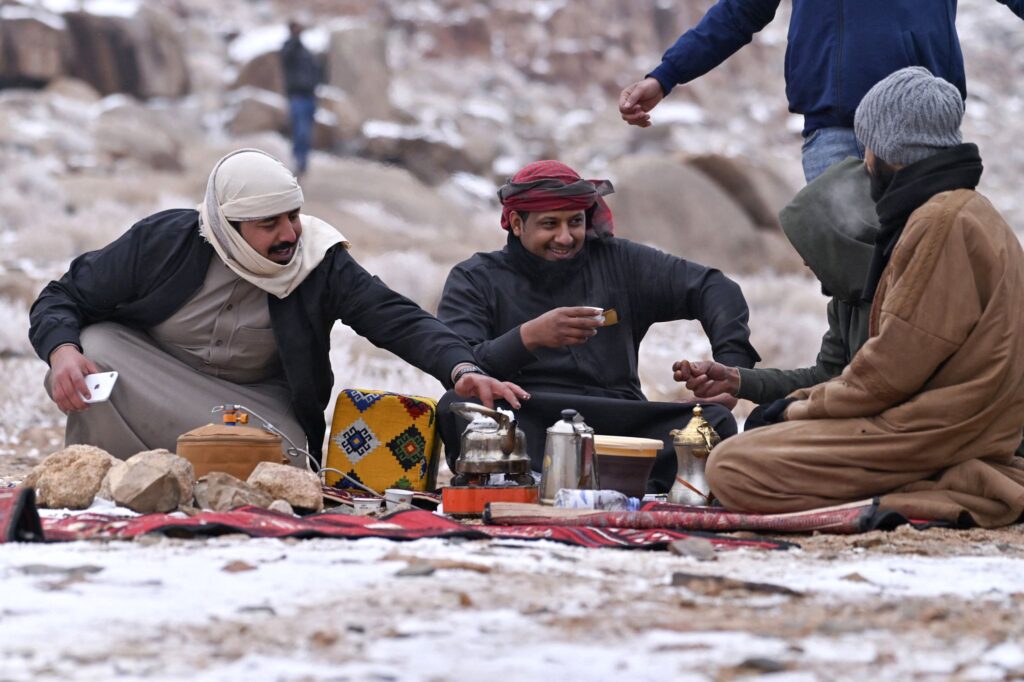It snowed out of the blue in the Tabuk area of Saudi Arabia. Tabuk is a city northwest of the country, not far from the border with Jordan. People usually know it for its big plains, rough mountains, and warm weather. But the weather changed strangely. Not only was Tabuk not dry and dusty like most places, but it also had white snow in some parts!
It made a big difference, even though it only snowed for a few hours. The weather changed because it got cold enough for snow to fall. A lot of Saudis who had never seen snow thought it was terrific.
Why doesn’t it snow very often in Saudi Arabia?
Saudi Arabia is known for its dry climate, meaning it gets cold at night and moderately warm during the Day. It can get really hot in the summer, with temps sometimes hitting 40 degrees Celsius. Winters are usually mild, and it doesn’t snow very often. In general, it doesn’t rain much in Saudi Arabia.
But sometimes, strange weather can bring a cold front that dumps quick, cold air over the area. The temperature can drop low enough for snow to form during this process. Even so, this is still very rare.

Why does it snow in the desert? What does that mean for the environment?
When it snows in the desert, it means that the weather is changing. Many experts think strange things happening worldwide, like snow falling in Saudi Arabia, could be linked to climate change. Climate change is the long-term change in temperature and weather trends worldwide. As a result of climate change-induced global warming, strange and surprising weather events may happen anywhere.
As the world’s temperature rises, predicting the weather is harder. If this happens, it could lead to extreme weather like heat waves, heavy rain in dry areas, or even snow in deserts. Even though it might not snow every winter in Saudi Arabia, events like these show how the climate is changing worldwide.
Could this Affect Tourism in Saudi Arabia?
This strange weather event has opened up new opportunities for tourists in Saudi Arabia. Many people in Tabuk and those visiting were interested in seeing the snow-covered desert. People from all over the country came to see this strange view. People wanted to take pictures, enjoy the beautiful scenery, and tell others about this once-in-a-lifetime event.

As part of its Vision 2030 plan, Saudi Arabia has promoted travel to attract more tourists and grow its economy. In the desert, snow might bring more people looking for this one-of-a-kind event. When things like this happen, Saudi Arabia might become exciting, even if it doesn’t snow again. Who wouldn’t want snow in the desert right now?
Will there be More Snow in the Desert?
Saudi Arabia will only have regular rain, if anyone can say. It is likely still pretty rare. If climate change keeps changing how the weather acts, strange things like snow falling in deserts might happen more often everywhere on Earth. As the temperature rises, areas may get more snow or rain that comes out of nowhere.
We can tell that the temperature is constantly changing because there is snow in Saudi Arabia. You can see how strong nature can be and how sudden weather can be at any time. Every year, the world experiences more and more harsh weather events. This means snow in a desert might be a small part of a much bigger worldwide trend.
The Bottom Line
It was a surprise and a fantastic sight when snow fell in the Saudi Arabian desert. The weather was hot in the Tabuk area, which is in the desert and doesn’t get much snow. People replied on social media by sharing their happy, excited, and surprising experiences. Many people thought it would be a once-in-a-lifetime chance to see snow in a place they hadn’t expected.
This rare snowfall also makes us think about climate change and how it changes the weather worldwide. When the weather changes, strange events can happen more often. When it snows in the desert, it tells us how beautiful and unpredictable the Earth is.
Who knows what other surprises nature has in store? People who used to live in the desert of Saudi Arabia will never forget snow as a beautiful sight.
Thank you for reading, click the link to read more of our Articles.
Inside Success presents to you our digital platform, created to inform, inspire and empower 16-35s. Through our articles, we aim to bring bold ideas, fresh voices and real conservations to life. From mental health advice, to career information, and fashion tips to social issue debates, Inside Success is proud to have created a platform that has something to cater to everyone.




Leave a Reply
You must be logged in to post a comment.